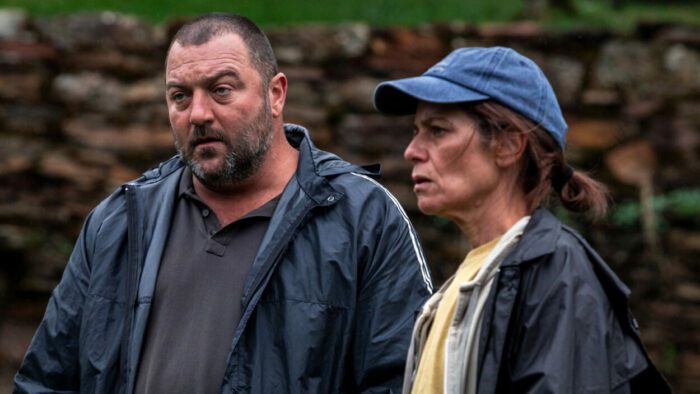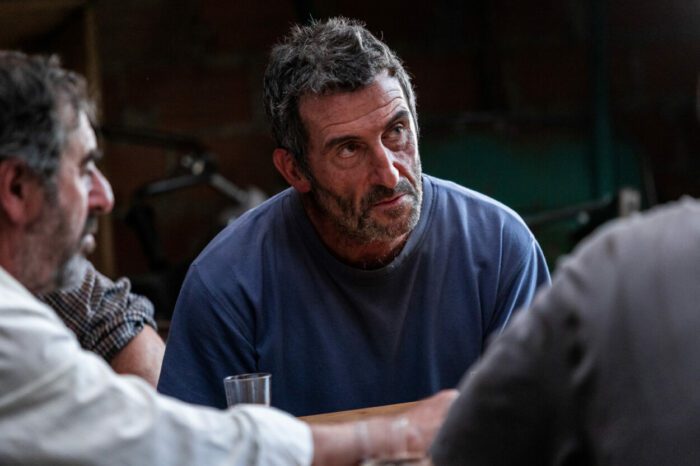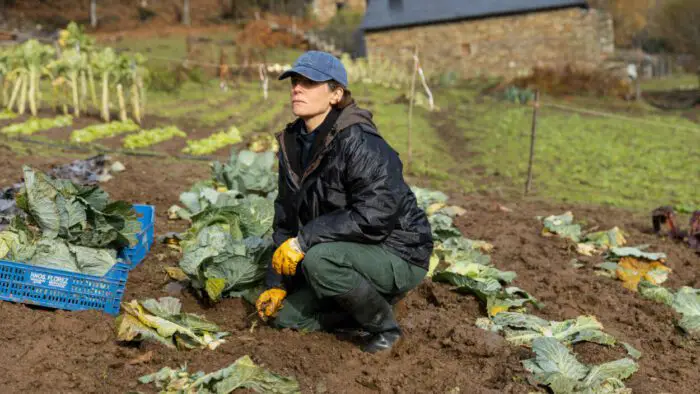Rodrigo Sorogoyen’s The Beasts (As bestas), a masterpiece of true-crime, social-problem cinema, swept the Goyas—Spain’s equivalent of the Academy Awards—last year with nine wins: Best Picture, Best Director, Best Actor, Best Supporting Actor, Best Original Screenplay, Best Original Score, Best Cinematography, Best Editing, and Best Sound. It opens this week for a theatrical run in the U.S., where its sober, cautionary tale of hostilities toward immigrants should prove, I hope, every bit as meaningful as it is in Sorogoyen’s native Spain.
The narrative is set in a Galician farming village that is both geographically idyllic and economically depressed. There a middle-class French couple, educated and progressive, have settled into a province where generations of poor Spanish farmers have struggled to earn a living from the land. Olga (Marina Foïs) and Antoine (Denis Ménochet) employ new sustainable practices, enjoy robust vegetable crops, and thrive at the local market. Antoine, a former schoolteacher, lends his handyman skills to the remodeling of several local farms and enjoys drinks and dominos at the local watering hole. A huge bear of a man with a probing wit and charming eyes, Antoine is a gentle but imposing character.

It’s there at the bar that the locals, full of liquid courage, like to commiserate about their woes. Who better to blame than the new guy, the foreigner, the charmer whose new methods thrive while the old fail? A crusty rogue named Xan (Luis Zahera) rules the roost here, laying out every thing he dislikes about Antoine’s methods. His brother Lorenzo (Diego Anido), addled by an accident of some sort, stares blankly in silent accord. Together, the sharp Xan and silent Lorenzo make for a threatening pair, and Antoine finds himself the victim of mild pranks that soon turn into terroristic threats.
There is, meanwhile, another wedge between the natives and the immigrants. A foreign company has offered the village residents fast money for the land, which they plan to use to install wind turbines for energy. Antoine and Olga, mindful of potential ill effects of the turbines and in less dire need for the money, have argued against accepting the offer, to Xan’s strong, if inchoate, opposition. That conflict becomes personal when Xan makes it his mission to ruin Antoine’s crops and drive him from the land.
As matters escalate, the screenplay by Rodrigo Sorogoyen and Isabel Peña slowly, inexorably turns the screws of hate. Antoine is a sympathetic character, Xan a canny rival, but the dynamics of gentrification are complex, and we never lose sight of the privilege the more moneyed, educated Antoine and Olga enjoy even as Xan and Lorenzo sabotage their crops and threaten their safety.

One can hardly say enough about the performances. Long dialogues between the three men are shot in a long take three-shot with each actor bringing his skill to the table. Anido’s character is mute and addled, slow to process information but a formidable threat himself. Zahera’s is often drunk but no less menacing, his careful words staking out his hostile aggressions. Ménochet’s a more garrulous, rational, pleading man hoping against hope that logic and reason can win out.
The film’s cinematography is equally first-rate, characterizing the province’s lush fecundity and stark economic woes with an elegant directness, as is its editing, ratcheting up the tension with each encounter between the principals. Antoine takes to filming their encounters clandestinely, but the cagey Xan is onto his gambit and divulges nothing but the most oblique of threats. The local police do little to assist Antoine and Olga, and soon the conflict between parties reaches its climax in a violent, awkward, fatal struggle—one that resolves little but serves only to deepen the hostilities.

The film’s final act takes The Beasts in a new direction, with a focus on Olga and the couple’s daughter Marie (Marie Colomb). It’s a logical consequence of what comes prior and in some ways laudable for its anti-violent stance but a stark difference from what came before. Some reviewers have lauded it, and Foïs’ character and performance, as the center of the film. I can see that, though I was far more engaged by and invested in Denis Ménochet’s performance as Antoine, both in his relatoinship with Olga and his conflict with the brothers Xan and Lorenzo, than anything that came after; how often is an oversized, intelligent, affable, dough-faced man character given such a plum, prized, multidimensional role in a feature narrative? (In Hollywood, next to never, unless it means putting Brendan Fraser in a fat suit.)
None of that is to take away from Foïs’ steely intelligence and resolve here. Letting the film come to focus on her character is something of a risk, but Sorogoyen knows his stuff. As one of Spanish cinema’s best known writer-directors, he’s been winning awards since his debut, Stockholm, earned him the Goya Award for Best New Director in 2013. The Beasts is his fifth feature film, and it’s an assured, professional, exacting work, nearly perfect in its execution. And while its conflicts may seem like a half a world away from the U.S., its tale of conflict between those born on the land and those later immigrating to it is as universal as they come. A psychological thriller that will haunt viewers for weeks and months, The Beasts is first-rate filmmaking, a bravura character study and social-problem film for our troubled times.
Directed by Rodrigo Sorogoyen from a screenplay by Rodrigo Sorogoyen and Isabel Pena, The Beasts opens in New York on Friday, July 28 and Los Angeles on Friday, August 4, followed by national expansion. A Greenwich Entertainment release. 2 hours and 18 minutes; in Spanish, Galician and French with English subtitles. Not rated.




